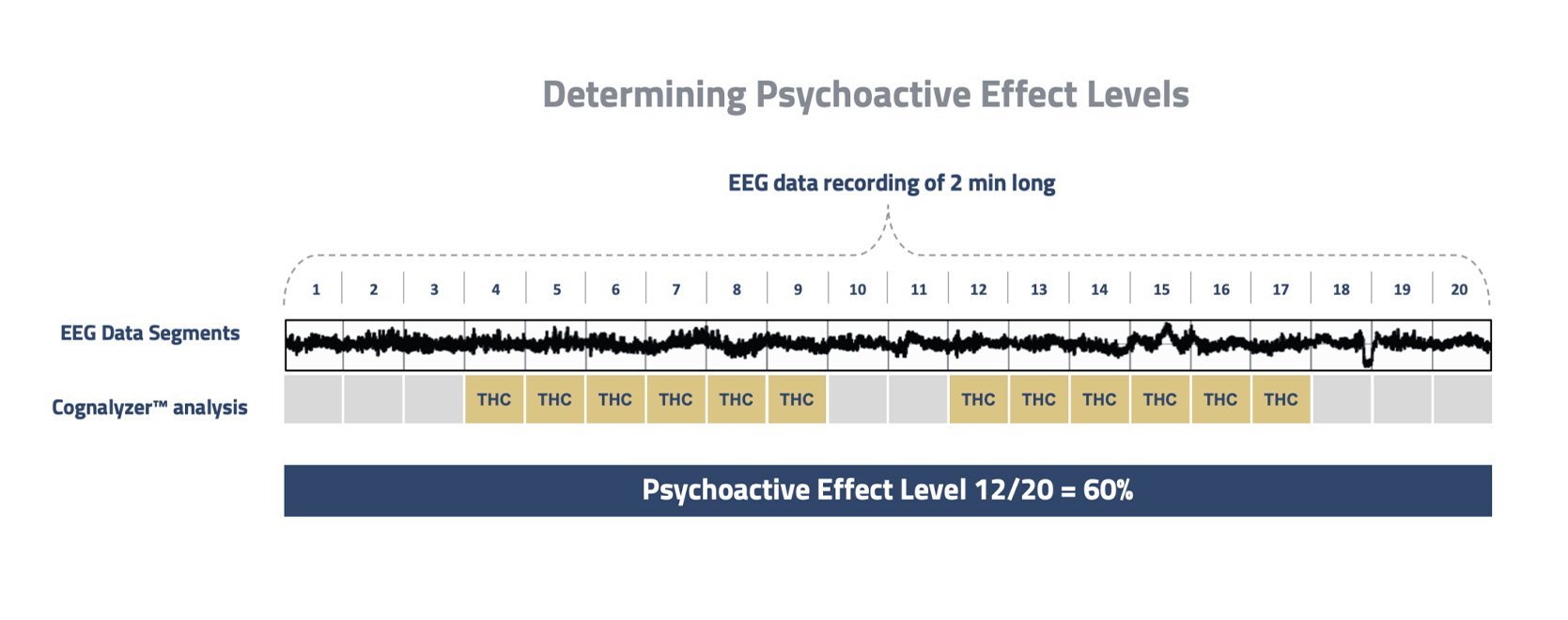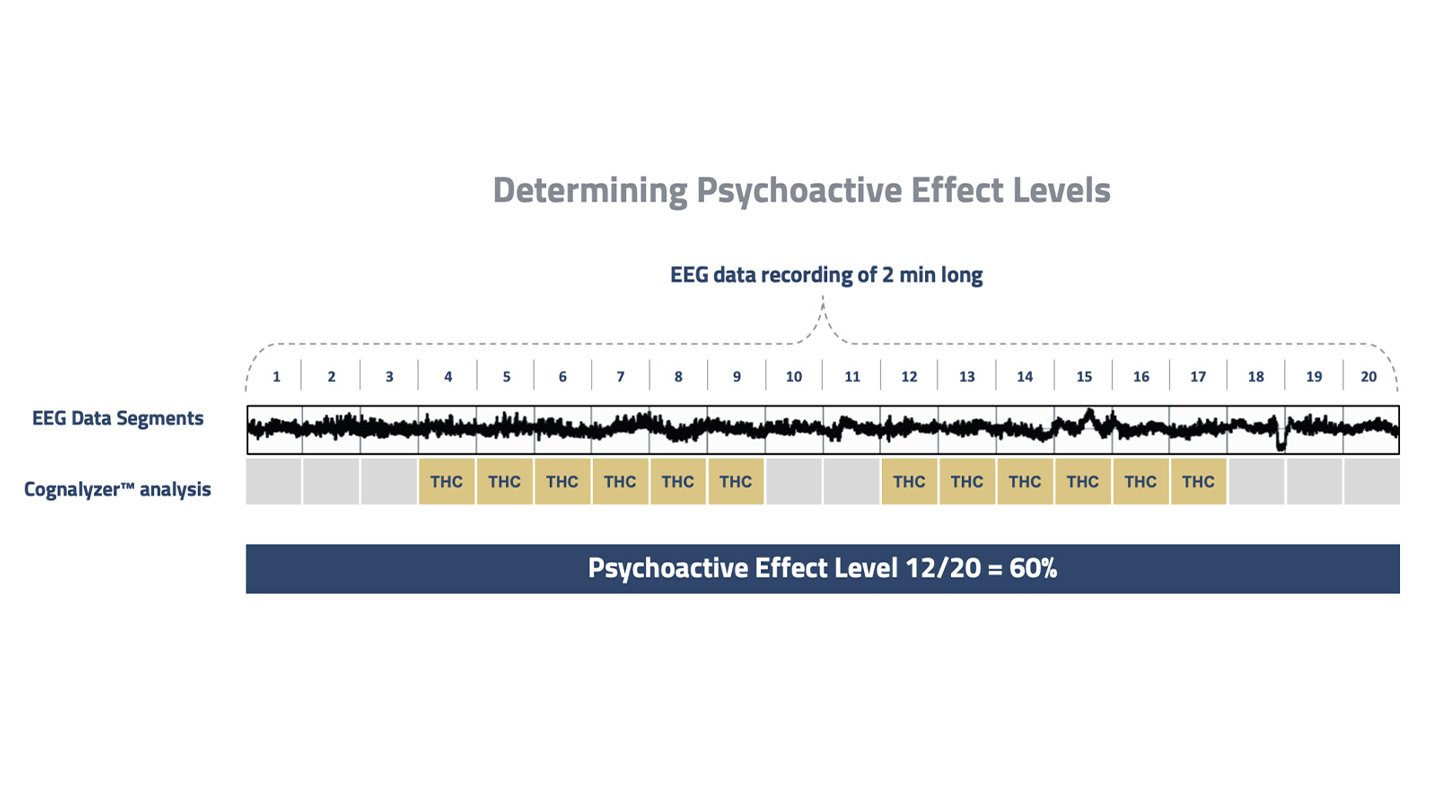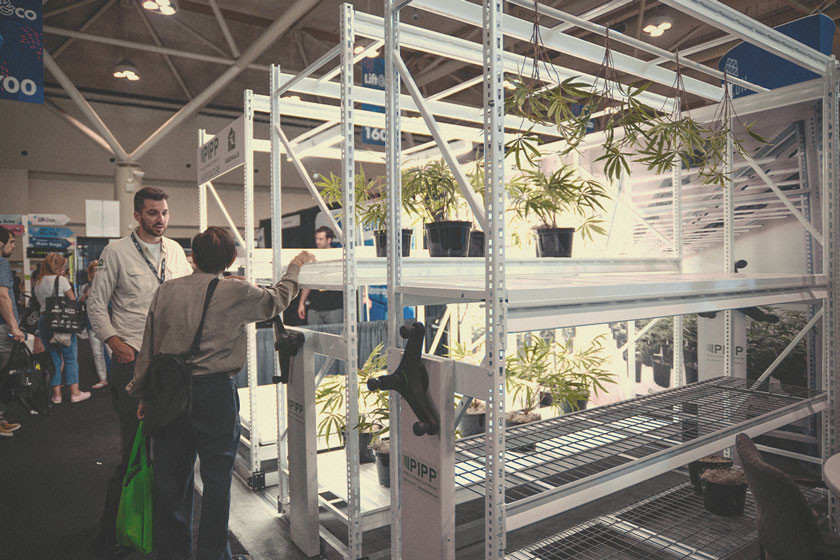.

How This THC Measuring Device Is Changing Cannabis Research
Workplaces and police offices currently use urine, saliva, and sometimes blood samples to test for THC. These methods check for THC in bodily fluids, but they don't reveal how impaired someone feels. That's where the Cognalyzer comes in. This piece of neurotechnology measures brainwaves to accurately sense whether someone is stoned.
Contents:
Innovative companies are working on more accurate ways to test for cannabis impairment. By using neurotechnology that measures brainwaves, employers and law enforcement agencies of the future could obtain more accurate insights into how stoned people truly are. While antiquated THC measuring devices use blood and saliva analises to test for traces of cannabis, they do little to elucidate a person’s mental state.
Based in Hamilton, Ontario, the startup Zentrela is looking to change the game when it comes to cannabis impairment testing. By harnessing neural signals and machine learning, the company aims to provide a more accurate alternative to current methods.
Founder Israel Gasperin created the company after graduating from McMaster University. Recognising the faults in urine, saliva, and blood sample testing, he sought to measure the effects of compounds like THC on the brain, rather than the quantity of the molecules themselves in fluid samples.
But this technology opens up other doors in the cannabis industry. Besides clearing up the murky waters of impairment testing, neurotechnology can help businesses analise and log the objective effects that their creations have on the brain.
Companies are looking to quantify how their "cannabis 2.0" products, such as extracts and edibles, affect the brain to create concrete selling points. Alongside cannabinoid and terpene profiles, you might soon find brainwave information alongside your favourite cannabis preparations.
Continue reading as we unravel the problems with current cannabis impairment testing methods, how neurotechnology will add huge improvements in this area, and if brainwave analysis will become an impressive marketing tool.
The Problem With Current THC Testing Methods
Consuming high-THC cannabis results in a pleasant and euphoric "high". While suitable for enjoying in verdant meadows or on your living room couch, sitting stoned behind the wheel of a car or controls of heavy machinery poses a significant risk. Cannabis and cannabinoid research shows that THC impairs executive function, motor control, and reaction time.[1]
For this reason, employers and law enforcement are tasked with testing employees and members of the public when the situation calls for it. Drivers in Canada, for example, face prosecution if blood THC tests measure as low as 2 nanograms (ng) per ml of blood.[2] Authorities in the country also use urine and saliva tests to follow up on blood test results.
Police in Scotland utilise “DrugWipes” roadside testing kits to identify impaired drivers. These mouth swab kits test for a wide range of substances, including cannabis, with a near zero-tolerance limit.[3]


While these testing procedures assign a number to the level of THC or its metabolites in different bodily fluids, they don’t indicate what’s happening in the mind. No direct correlation exists between the concentration of these molecules and the psychotropic experience happening within a person’s head. Not to mention, researchers are calling the validity of saliva samples into question, and point to risks of disease transmission in regard to urine testing.[4]
Employees that work in safety-sensitive industries are also required to undergo regular THC drug testing to ensure a safe work environment. In the United States, federal workers within railroad, transit, aviation, and highway sectors are subject to random THC drug testing, and must also face tests following “reasonable cause or suspicion” of impairment.[5]
However, the problems with current testing methods mean workers could flag up positive on the job because of lingering metabolites, without feeling high and with their motor skills fully intact.
Of course, many employers don’t care whether their workers smoked a joint one week or ten minutes ago. But the problem becomes even more apparent when weighing up the legal implications. Drivers and workers face reputational damage, job loss, and legal fines based on the level of cannabinoid metabolites in their blood, not on how impaired they are behind the wheel or while operating a machine.
Zentrela hopes to solve this issue using technology that bypasses bodily fluids and instead peers into the mind.
The Solution: Enter the Cognalyzer
It might sound like some kind of thought-stealing contraption from Orwell’s 1984, but the Cognalyzer does away with residual metabolites and takes a look at the state of a person’s brain activity.
Zentrela managed to raise $1.2 million from an array of nonprofits and government bodies to build the novel electroencephalogram (EEG). The Cognalyzer has now surpassed the status of a mere idea. The company commissioned research into the efficacy of their device; the results from the 2021 study are available in the peer-reviewed journal Advances in Therapy.[6]
The paper includes a summary of the research, including the main objective: “Current standards for identifying impairment are based on body fluid testing to detect recent cannabis use and behavioural assessments; therefore, determining cannabis impairment with accuracy and objectivity is crucial as legalization has increased use”.
The authors also state the importance of neurotechnology in cannabis testing, stressing that current testing methods can detect metabolites in bodily fluid days after ingestion, and even in cases of passive exposure.


During the study, researchers placed ten EEG electrodes onto the participants' heads and took a 2.5-minute baseline recording with the Cognalyzer, which streamed data via Bluetooth to a nearby laptop. They also took an additional oral fluid sample from underneath the tongue.
The team then used two different algorithms—V1 and V2—to analise the brainwave data and provide diagnostic results. Impressively, both algorithms clocked in with an accuracy of over 80%. The researchers also measured for sensitivity (the ability of the test to correctly identify impaired participants) and specificity (the ability of the test to correctly identify non-impaired participants). The Cognalyzer scored 87% and 84% in these areas, respectively, using V1.
The researchers also tested the diagnostic accuracy of oral fluid samples alone, and the Cognaylzer and oral fluid samples in conjunction. Overall, they found that combining the Cognalyzer with oral fluid testing for THC improved diagnostic performance. In regard to neurotechnology, they concluded the Cognalyzer “..is a novel and reliable cannabis detection tool that has potential to be administered both roadside and in the workplace”.
Can the Cognalyzer Change Consumer Education?
The uses of the Cognalyzer don’t stop at impairment testing. Investors are curious about leveraging the data produced by the device to accurately chart the effects of cannabis 2.0 products such as edibles and extracts. Jornic Ventures, an investment group from Calgary, is so confident in this approach that they poured $850,000 into Zentrela purely for this reason.
Instead of THC values, terpene profiles, and user reviews, Zentrela wants to pair cannabis products with brainwave data. Testing participants under the influence of a host of oils, concentrates, edibles, and tinctures will enable the company to build a database that documents the effects of individual items. The company plans on licencing this data to retailers, which will help outlets such as dispensaries give consumers a much more detailed view of how each product will affect them and what they can expect.
The Sci-Fi Future of THC Testing Is Approaching
Don’t expect to see traffic cops and employers deploying Cognalyzer tests just yet. It’ll take a lot more refinement, cannabis research and development, data collection, and convincing until these devices hit the streets and workplaces.
However, these early steps are a promising sign that cannabis impairment testing will change for the better, in a way that benefits users. It seems likely that the product data generated by this technology will impact retail much sooner. As consumers still get to grips with the concept of chemovars and cultivars, it seems they’ll have to get the hang of a new way to classify the cannabis high soon too.
- High-Potency Marijuana Impairs Executive Function and Inhibitory Motor Control | Neuropsychopharmacology https://www.nature.com
- How do police test for cannabis-impairment? - FREE Legal Information | Legal Line https://www.legalline.ca
- Police roadside testing kits introduced ahead of new drug driving regulations – SDF – Scottish Drugs Forum https://www.sdf.org.uk
- Correlation between Blood and Oral Fluid Psychoactive Drug Concentrations and Cognitive Impairment in Driving under the Influence of Drugs - PubMed https://pubmed.ncbi.nlm.nih.gov
- Considerations for Safety- and Security-sensitive Industries | SAMHSA https://www.samhsa.gov
- Sensitivity, Specificity and Accuracy of a Novel EEG-Based Objective Test, the Cognalyzer®, in Detecting Cannabis Psychoactive Effects | SpringerLink https://link.springer.com







































